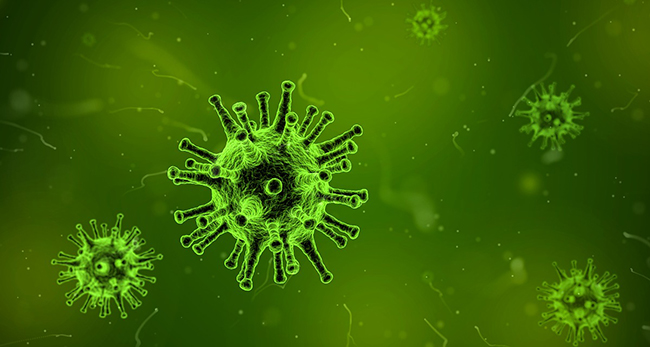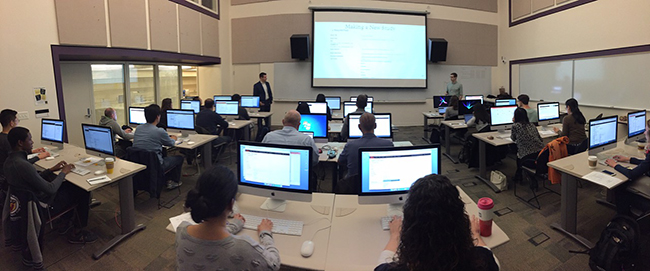Home » News » Vanderbilt Microbiome Initiative Launches New Website
Vanderbilt Microbiome Initiative Launches New Website
Posted by anderc8 on Monday, May 14, 2018 in News, TIPs 2017.

Seth Bordenstein, Director, Vanderbilt Microbiome Initiative
Written by Seth Bordenstein, Associate Professor of Biological Sciences and Pathology, Microbiology, and Immunology
The Vanderbilt Microbiome Initiative, established in 2017 with the support of a Trans-Institutional Programs (TIPs) award, recently launched a new website. This initiative, which includes 135 members (both faculty and students) from five schools and colleges, aims to coordinate and accelerate basic, translational and clinical scholarship on the microbiome.
You may be asking yourself what exactly is the microbiome? The microbiome is the totality of microbes (bacteria, archaea, viruses, etc.) in an environment, including your body, home, food, plants, water, etc. By its very definition, the microbiome is invisible without the aid of a microscope. If you were to strip away your human cells and peak through the looking glass, your microbial associates would shine bright. As you delve into this hidden world, you quickly realize that humans are not the central feature of life on Earth. The planet houses more bacteria than stars in the universe. They control the renewal of essential elements for life and potentially impact atmospheric processes. Each human is composed of an amalgam of cells that are roughly half microbial and half human. The total number of genes from these different microbial cells is more than 100-fold higher than the number of your genes, and their genomes encode small chemical metabolites that can stream through your blood and affect bodily functions. Estimates indicate our gut cells may absorb 31 billion viruses every day. It is probably wise to pause here and note that our microbial ecosystem is mostly helpful or harmless. They digest our food, fine tune our immune system, and assist numerous other healthy processes.

Schematic image of viruses, billions of which are estimated to enter the cells in your intestine every day. Recent experiments at Vanderbilt University indicate that genes in viruses of bacteria (Wolbachia) can transfer to or from animals, and some virus genes hijack insect sperm to cause an infertility at the forefront of mosquito control efforts.
This past year, our program awarded the Microbiome Venture Fund to five assistant professors (Nicole Creanza, Annet Kirabo, Ann Tate, Fang Yan and Jonathan Schmitz) to catalyze new projects that supported undergraduate, graduate and postdoctoral research. Members meet monthly during the academic year to learn about innovative scholarship, discuss new resources, and evaluate grant proposals. We also host seminar speakers and help in the recruitment of new microbiome faculty. We began Vanderbilt’s first clinical microbiome study to evaluate the role of ethnicity and diet in shaping our personalized microbiomes. Recently, we joined the National Microbiome Data Collaborative to integrate diverse areas of microbiome research and pioneer the future of microbiome exploration and discovery.
Through a collaboration with the College of Arts & Science, Peabody College and the School of Engineering, high school and graduate students are building a VµBiome web-based application to log metadata from subjects in the clinical microbiome study. Undergraduates immersed themselves in microbiome research projects including the clinical microbiome study, and three postdoctoral scholars coordinated Vanderbilt’s first Microbiome Boot Camp to enable newcomers to conduct their own microbiome studies. The international science education program The Wolbachia Project: Discover the Microbes Within! brings real-world research and biotechnology to thousands of high school and college students per year around the world.

At the inaugural Microbiome Boot Camp in Peabody College, 24 participants spanning students to faculty learned to conduct their own microbiome experiment and analysis.
Many disciplines not mentioned above will be impacted by the new science of the microbiome, including law, ethics and the arts. It is clear that everything you see with your eye is just the smallest sliver of life on Earth – humans are bystanders in this microbial world. Please check the Vanderbilt Microbiome Initiative website regularly and feel free to join the conversation by leaving a question or comment in the space provided below. Better yet, sign-up for our newsletter for regular updates on the program’s progress at the website.
One Comment on “Vanderbilt Microbiome Initiative Launches New Website”
Film streaming vf on November 1st, 2018 at 3:17 pm
congrats for microbiome website
